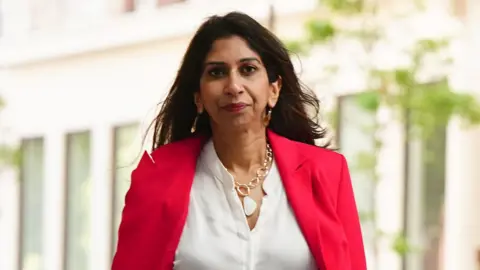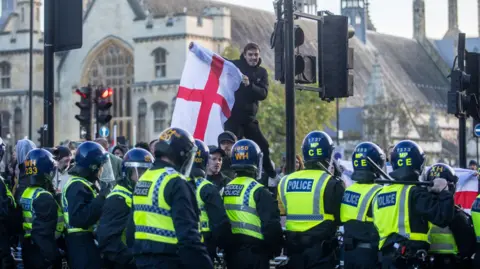Braverman wrong to slam Met over rally - report
 PA Media
PA MediaSuella Braverman should not have publicly criticised the Met Police over its handling of pro-Palestinian marches, a watchdog has found.
Writing in The Times in November, the former home secretary accused the force of bias in policing the protests.
Ch Insp of Constabulary Andy Cooke has said she should have made the comments in private, if they were appropriate.
In a report, ordered by Ms Braverman herself, he also details how police chiefs claimed to have often been subject to "improper" political interference.
This included pressure from Ms Braverman to ban a march planned for Armistice Day.
She had previously publicly criticised the timing of this event, while the then-Prime Minister Rishi Sunak asked the organisers to cancel the rally.
Mr Sunak later sacked Ms Braverman after she was accused of stoking tensions ahead of protests in London, which were being held in response to the Israel-Gaza protest.
 PA Media
PA MediaIn her article, she said "pro-Palestinian mobs" were "largely ignored, even when clearly breaking the law", while aggressive right-wing protesters are met with a stern response by officers, whom she accused of "double standards".
But the force said it had no legal powers to ban the march due to a lack of intelligence indicating any risks.
More than 100 arrests were made after right-wing protesters clashed with officers, while some members of the large pro-Palestinian march were accused of using antisemitic slogans.
'Risk of improper political interference'
Mr Cooke produced the report for His Majesty’s Inspectorate of Constabulary and Fire & Rescue Services (HMICRFS) after Ms Braverman called on the watchdog to inspect how police handle politically contested matters in September last year.
He found that both police forces and politicians should "pay close attention to the risk of any improper political interference".
"This includes the risk of actual interference or perceived interference, whether that perception is accurate or not. Usually, such an intervention, if deemed appropriate, should be done in private."
Mr Cooke also said the report had identified "overt attempts to influence operational policing challenge the police's impartiality", which could reduce public trust.
The report highlighted an incident in which Mr Sunak apparently backed down after initially mistakenly criticising a police officer dealing with protesters, based on a single video clip.
The report said: "Senior politicians should take great care to make sure they are in possession of the full facts before making public statements that can have a detrimental effect on the public perception of police impartiality."
Making 22 recommendations for improvement to the Home Office, National Police Chiefs' Council (NPCC) and College of Policing, Mr Cooke described the inspection as one of the most "challenging" the watchdog had carried out.
Ms Braverman has been approached for comment.
A government spokesperson said: "Our police officers face challenges every single day and act without fear or favour to keep our streets safe, and it is vital they are supported.
"The government strongly supports operational independence, which is the bedrock of our policing model.
"We welcome the report and will work closely with policing to consider the recommendations."
In a separate report published on Monday, the Met's Assistant Commissioner Matt Twist was reported to have admitted in May that the force "didn't get everything right" in handling such protests.
He told the Policy Exchange, external right-wing think tank, that the force could have made arrests sooner during some large-scale events recently.
Listen to the best of BBC Radio London on Sounds and follow BBC London on Facebook, X and Instagram. Send your story ideas to [email protected]
